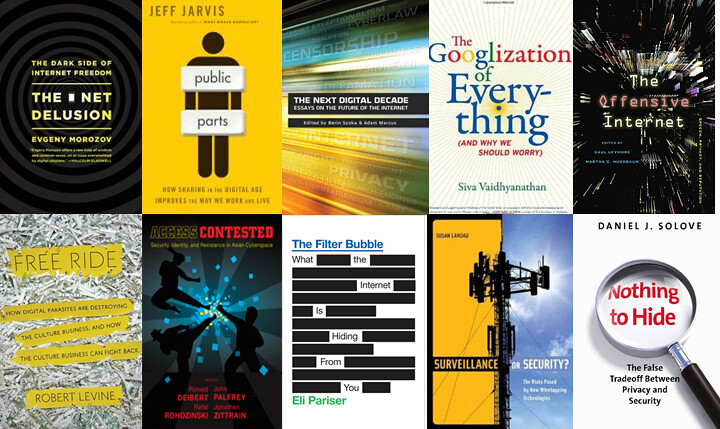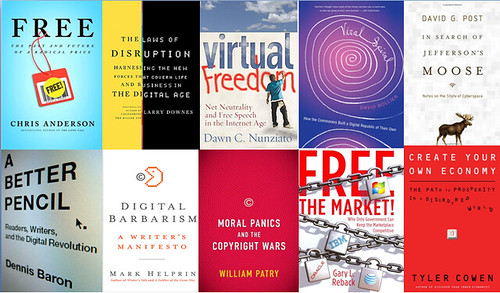
Salió la lista de los mejores libros sobre tecnología publicados este año que por estas épocas publica Adam Thierer en The Techonology Liberation Front (Important Cyberlaw & Info-Tech Policy Books (2011 Edition)) (Véase 2008, 2009 y 2010). A diferencia de años anteriores, Thierer nos presenta esta vez una entrega temática dejando de lado el ranking general al que nos tenía acostumbrados. Una pena, tenía su morbo.
Libertad en Internet / Reglamento Net y Gobierno
Hay que destacar aquí el trabajo de Szoka y Marcus con más de treinta artículos de una variedad de temas relacionados con la regulación de Internet. Y, lo más importante, se puede descargar de forma gratuita integramente.
- Evgeny Morozov – The Net Delusion: The Dark Side of Internet Freedom.
- Micah Sifry – WikiLeaks and the Age of Transparency.
- Ronald J. Deibert, John G. Palfrey, Rafal Rohozinski and Jonathan Zittrain – Access Contested: Security, Identity, and Resistance in Asian Cyberspace.
- Eddan Katz & Ramesh Subramanian (Eds.) – The Global Flow of Information: Legal, Social, and Cultural Perspectives.
- Berin Szoka & Adam Marcus (Eds.) – The Next Digital Decade: Essays on the Future of the Internet.
- Becky Hogge – Barefoot into Cyberspace: Adventures in Search of Techno-Utopia.
- Laura DeNardis – Opening Standards: The Global Politics of Interoperability.
Privacidad y seguridad
- Saul Levmore and Martha C. Nussbaum (Eds.) – The Offensive Internet: Speech, Privacy & Reputation.
- Jeff Jarvis – Public Parts.
- Daniel Solove – Nothing to Hide: The False Tradeoff between Privacy and Security.
- Susan Landau – Surveillance or Security? The Risks Posed by New Wiretapping Technologies.
- Daniel Solove & Paul M. Schwartz – Privacy Law Fundamentals.
- Terence Craig and Mary Ludloff – Privacy & Big Data.
Net pesimismo / Google-fobia / Derechos de Autor
- Eli Pariser – The Filter Bubble: What the Internet is Hiding From You.
- Siva Vaidhyanathan – The Googlization of Everything, and Why We Should Worry.
- John Brockman (Ed.) – Is the Internet Changing the Way You Think? The Net’s Impact on Our Minds and Future.
- Sherry Turkle – Alone Together: Why We Expect More from Technology and Less from Each Other.
- Scott Cleland – Search & Destroy: Why You Can’t Trust Google Inc.
- Robert Levine – Free Ride: How the Internet is Destroying the Culture Business and How the Culture Business can Fight Back.
- William Patry – How to Fix Copyright.
El mejor libro del año es…
Para el autor de esta lista el mejor trabajo publicado el 2011 es The Net Delusion: The Dark Side of Internet Freedom de Evgeny Morozov. Les dejamos con una pequeña reseña del mismo:
«(…) la importancia del trabajo de Morozov no se puede negar. Ha abierto un nuevo frente en la batalla intelectual sobre el papel de la Red en varios movimientos políticos y sus causas. Su objetivo es encabezar lo que podríamos considerar como el movimiento «realista», que contrarresta el enfoque más «idealista» (él diría «utópico»), que ya tiene muchos adeptos en los debates globales sobre política de Internet. Morozov ha abierto la puerta a un pensamiento más escéptico al respecto. Muchos estarán propensos a seguir sus pasos, y cuando lo hagan, todos citarán a Net Delusion. Del mismo modo, los idealistas, ahora se verán obligados a responder a Morozov. Por lo tanto, vamos a estar discutiendo y debatiendo los temas Net Delusion durante muchos años.»
